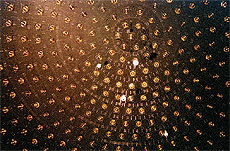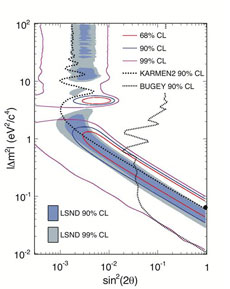Recent results, future plans focus of neutrino workshop

The MiniBooNE detector, shown above, was one project at the recent Short-Baseline Neutrino Workshop that presented interesting results. Photo: MiniBooNE collaboration.
When exciting results are popping up all over the place, it calls for bringing the best minds together from around the world to discuss the findings and make plans for the future.
That's precisely what happened at the Short-Baseline Neutrino Workshop 2011, which took place May 12-14 at Fermilab. More than 100 people from 44 institutions attended.
Neutrinos are a million times lighter than an electron and are electrically neutral, which allows them to pass through matter unaffected, making them difficult to detect. Neutrinos exist in three flavors: muon, electron and tau, and have the ability to transform from one flavor into another, a process known as oscillation.
The purpose of various short-baseline neutrino experiments is to explore questions about neutrinos that travel over a relatively short distance.
Recently, a number of tantalizing results have sprung up from both short and long baseline experiments, which seem to suggest that neutrino oscillations occur under circumstances that were previously believed to not allow them, said Bill Louis, physicist at Los Alamos National Laboratory and workshop co-organizer.
"Even if just one of these results is correct, it may possibly have a profound impact on our understanding of particle and nuclear physics," Louis said.
Learning more about this area of physics is a key part of Fermilab's future.
A few months after the Tevatron shuts down, there will be an 11-month period during which scientists will improve on proton sources to better serve experiments at the Intensity Frontier, including neutrino, kaon and muon programs, said Fermilab Deputy Director Young-Kee Kim. Once the complex comes back online, Fermilab plans to resume operation of neutrino beams using both 120 GeV and 8 GeV protons on the neutrino-production targets.

Antineutrino data from MiniBooNE show the region of oscillation parameter space that is allowed at 90 percent confidence level (solid blue curve)." These results were consistent with findings from LSND, and were among the findings discussed at the Short-Baseline Neutrino Workshop that took place at Fermilab last week.
In their lectures, Steve Holmes, project manager for the proposed Project X, and Chris Polly, acting project manager for the future muon g-2 experiment at Fermilab, touched on the topic of the proposed beamlines. Kim further discussed future plans and solicited attendee feedback.
The ensuing discussions yielded a consensus amongst workshop attendees: The beamlines have tremendous potential, but measures will need to be taken to minimize background signals caused by cosmic radiation. Some possibilities include reusing or repurposing already existing equipment, or building additional components, which could result in a high-intensity neutrino beam that would be suitable for future experiments.
Workshop speakers also touched on what can be done in the interim between now and Project X. Among these speakers were: Geoffrey Mills (LANL), who discussed the potential of BooNE, the two-detector version of MiniBooNE; Roxanne Guenette (Yale University), who presented an overview of liquid argon detector applications in the MiniBooNE beamline; and Ryan Patterson (CalTech) and John Cooper (Fermilab), who spoke on what could be accomplished with a third NOvA detector.
See a full list of presenters online.
Louis was most impressed by the quality and diversity of the talks that touched on both experimental and theoretical issues and covered the gamut of neutrino topics.
"The talks were uniformly excellent," Louis said. "It was just great hearing all of the different possibilities and plans for future neutrino experiments."
— Christine Herman
|